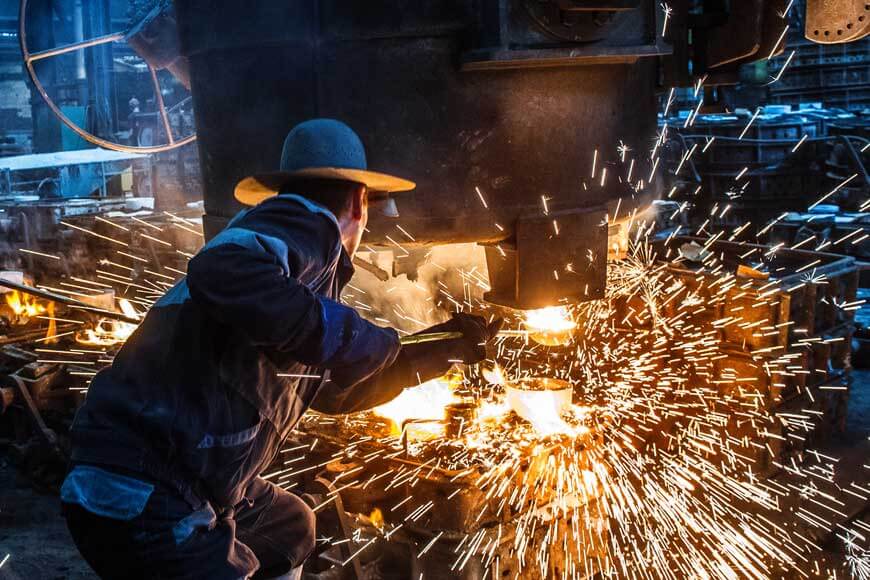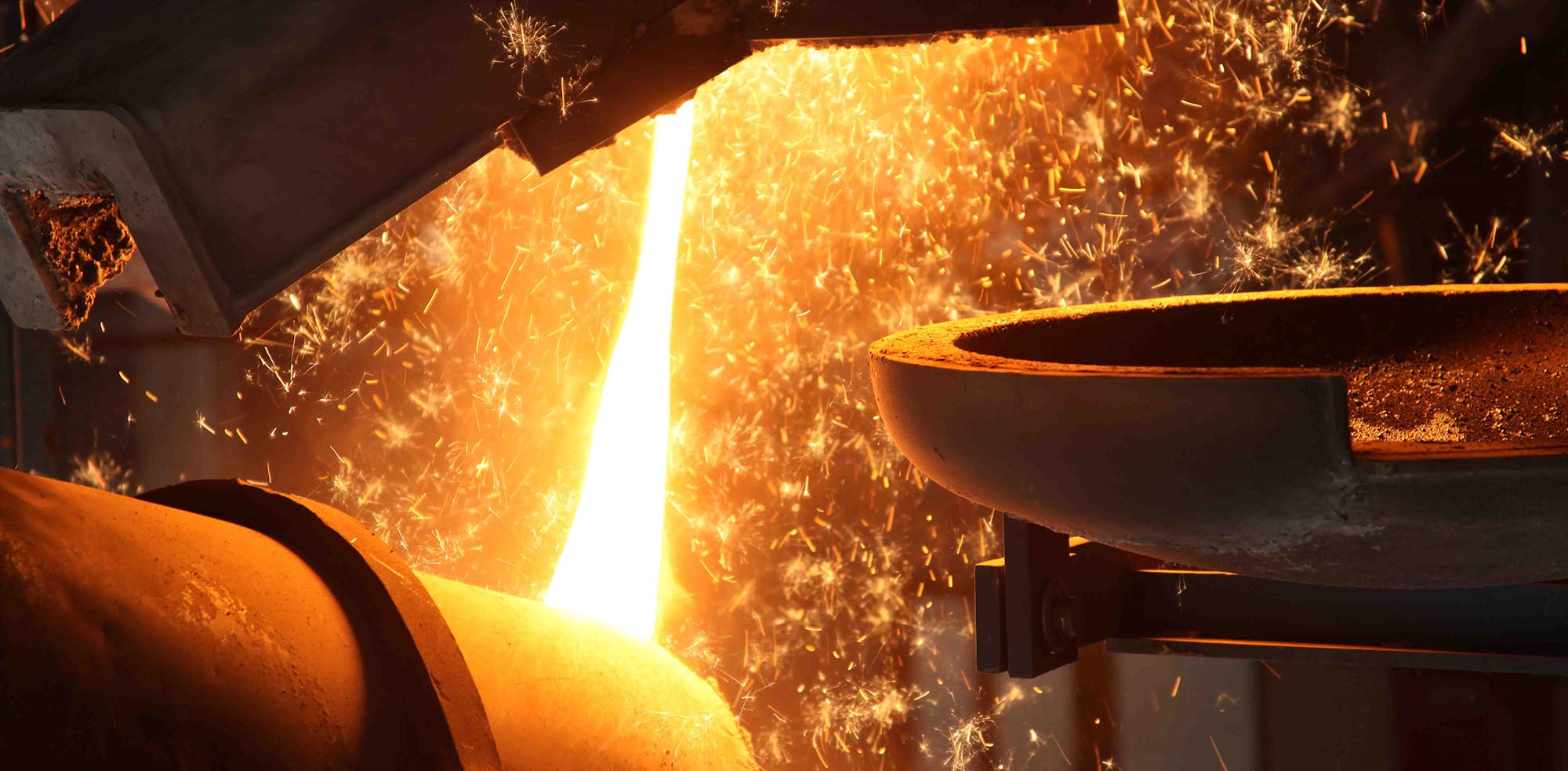The science and precision behind every Aluminum Casting process
Wiki Article
All Concerning Metal Foundries: Recognizing Their Duty in Modern Manufacturing
Metal factories are vital in the production landscape, offering essential solutions via different spreading strategies. These facilities change molten steel right into solid kinds, dealing with varied markets. As innovation advances, foundries are adopting ingenious practices and rigorous quality assurance measures. However, the environmental impact of metal casting increases important questions. Recognizing these characteristics is considerable for realizing the complete relevance of foundries in modern production. What developments and obstacles exist in advance for this market?
The Fundamentals of Steel Casting Techniques
Steel casting methods create the foundation of the metal foundry industry, helping with the change of molten steel into solid items. These techniques include a number of techniques, each customized to meet details production needs. Sand casting, among the oldest techniques, uses sand mold and mildews to develop intricate forms. Financial investment casting, known for its accuracy, utilizes wax patterns covered in a ceramic shell, allowing for thorough styles. Die spreading, meanwhile, relies upon high-pressure injection of liquified metal right into steel mold and mildews, creating high-grade and regular parts.Lost foam casting uses advantages in generating intricate geometries without the demand for traditional mold production. Each spreading strategy plays a crucial duty in achieving preferred mechanical residential properties, surface area finishes, and manufacturing quantities. As sectors evolve, these methods adjust to include innovations in modern technology, making certain effective and lasting production processes. Recognizing these basics equips stakeholders to make educated choices in metal production.
Types of Metals Made Use Of in Factories
In the domain name of foundries, the option of steels substantially influences the casting procedure and the final product's performance. Numerous steels are used, each offering unique top qualities matched for different applications. Commonly used metals include light weight aluminum, known for its light-weight and corrosion resistance; actors iron, which gives outstanding wear resistance and machinability; and steel, valued for its stamina and durability.Furthermore, copper alloys, such as bronze and brass, are preferred for their visual appeal and outstanding thermal conductivity. Specialty steels, like titanium and magnesium, are made use of in details markets due to their unique residential or commercial properties, such as high strength-to-weight ratios.
The option of metal inevitably relies on the intended application, needed mechanical properties, and environmental factors to consider. Each kind of metal contributes distinctively to the factory procedure and influences the total top quality and capability of the produced parts.
The Importance of High Quality Control in Steel Foundries
Quality control plays a crucial role in guaranteeing that the items made in steel factories meet industry requirements and consumer assumptions. This process involves methodical monitoring and assessment of different phases of production, from resources selection to the last casting. Implementing rigorous quality control actions assists identify defects early, minimizing waste and revamp prices.Factories use a range of testing approaches, including aesthetic examinations, dimensional checks, and metallurgical analyses, to verify that the castings adhere to specified resistances and material residential properties. Constant high quality control not only enhances product integrity yet likewise constructs customer depend on and satisfaction.
Furthermore, adherence to high quality criteria frequently causes compliance with governing demands, which is considerable in markets such as aerospace and auto. Finally, quality assurance is crucial for preserving the honesty of the casting procedure and guaranteeing the long life of metal factory products in open markets.
Developments in Factory Modern Technology
Advancements in modern technology are reshaping the landscape of metal foundries, enhancing performance and item top quality. The assimilation of automation and robotics in factory operations has streamlined processes, lowering labor costs and lessening human error. For instance, automated sand molding systems enable faster manufacturing cycles and enhanced precision in casting forms.The adoption of sophisticated simulation software program has reinvented the layout phase, allowing engineers to predict and solve prospective issues before physical production begins. This brings about a significant decrease in material waste and remodel.
Furthermore, innovations in 3D printing technology are permitting the quick prototyping of complex components, facilitating faster design model and modification. Ultimately, the development of brand-new alloys and products improves the performance of actors items, satisfying the evolving demands of different markets. Collectively, these technologies are positioning steel foundries at the center of modern-day production, capable of supplying top quality products with better performance.
Environmental Considerations in Steel Casting
As the metal spreading market develops, ecological considerations are becoming progressively important. Growing recognition Aluminum Casting of environment modification and source depletion has actually triggered factories to adopt lasting practices. This consists of lowering power usage and using cleaner modern technologies, such as electric heaters and enhanced mold products that minimize discharges.In addition, reusing scrap metal has acquired importance, not only to preserve sources yet additionally to lower landfill waste. Factories are likewise checking out different binders and finishes that are less unsafe to the environment.
Governing stress and customer need for sustainable products better force the industry to introduce. Partnership with environmental companies aids steel foundries identify best techniques and create approaches for waste administration.
Often Asked Inquiries
What Are the Main Industries That Rely on Metal Foundries?
The main industries that depend on steel factories consist of automotive, building and construction, aerospace, and machinery production. These industries rely on cast steel elements for their items, ensuring durability and performance in different applications and atmospheres.How Do Foundries Guarantee Worker Safety Throughout Steel Casting Processes?
Shops carry out rigorous security methods, including personal safety devices, air flow systems, and regular training programs. By checking discharges and temperatures, they decrease dangers associated with metal casting, making certain a safer working atmosphere for employees.What Skills Are Essential for Workers in a Metal Foundry?
Necessary abilities for workers in a metal foundry consist of technological effectiveness in machinery procedure, attention to detail, analytical capacities, security understanding, teamwork, and solid communication skills to properly work together in a vibrant manufacturing setting.How Do Shops Handle Waste Materials and Recycling?
Foundries take care of waste materials through organized collection, partition, and reusing processes. They often repurpose metal scraps, employ purification systems for pollutants, and team up with recycling facilities to reduce environmental effect and promote sustainability within their procedures.
What Is the Common Lead Time for Metal Spreading Projects?
The regular preparation for steel spreading jobs varies from a number of weeks to a few months, depending on factors such as complexity, products required, and manufacturing ability. Timelines may differ based upon specific project needs.Metal factories are vital in the manufacturing landscape, supplying important services via different casting techniques. Aluminum Casting. Steel casting methods form the structure of the steel factory market, assisting in the improvement of molten steel right into strong things. In the domain of factories, the option of steels considerably influences the spreading process and the last item's efficiency. Quality control plays a vital function in guaranteeing that the products produced in steel shops satisfy industry requirements and customer expectations. The major markets that rely on metal foundries consist of automobile, building and construction, machinery, and aerospace production
Report this wiki page